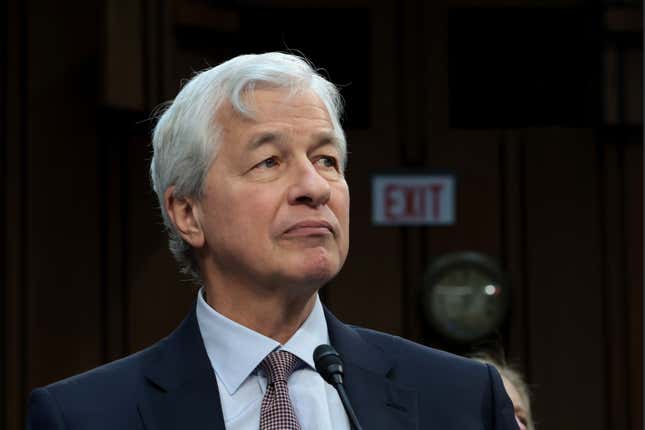
As a shadow hangs over hopes for the Federal Reserve to cut interest rates this year, JPMorgan Chase CEO Jamie Dimon is warning people to expect the unexpected.
“We don’t really know what’s going to happen,” Dimon said in a call with analysts Friday after the bank reported first-quarter earnings that beat Wall Street expectations.
Geopolitical conflicts like the wars in Ukraine and Israel, rising oil and gas prices, and uncertainty surrounding U.S. fiscal spending and elections are all factors that have kept Dimon cautious about the economic outlook — and stopped him from making sweeping predictions. Although the economy is doing “OK” right now, he said Friday, that doesn’t necessarily mean it will still be OK down the road.
Speculation about interest rates, yield curves, and other economic indicators are based on generally accepted economic scenarios. Today, that is the expectation that the Federal Reserve will cut interest rates.
“These numbers have always been wrong,” Dimon said.
“You have to ask the question: What if other things happen, like higher rates, or a modest recession, etc., and then all these numbers change?” he said. “I just don’t think any of us should be surprised if and when that happens.”
Read more: JPMorgan, Citi, and Wells Fargo kicked off bank earnings. Here are the highlights
In his annual letter to shareholders earlier this week, Dimon struck a similarly cautious note on the uncertainty of economic outcomes. JPMorgan is “prepared for a very broad range of interest rates, from 2% to 8% or even more,” paired with an equally wide range of economic outcomes, he wrote.
Interest rates are currently sitting at 5.25% to 5.5% amid the Fed’s ongoing fight against inflation, which has fallen considerably from its 2022 highs but remains elevated above the Fed’s target of 2%. And the central bank continues to show little interest in rushing to bring rates down.
Inflation popped up in March, with the consumer price index rising to 3.5%, continuing an upward trend that has started 2024 on the wrong foot for the Fed.
The readings have cast further doubt on whether the central bank will cut rates by the summer — or even at all — as was previously expected. Federal Reserve Bank of Minneapolis President Neel Kashkari said last week that the central bank may not cut interest rates at all in 2024 if inflation remains stubbornly high.
Economists remain pretty evenly split as to whether the Federal Open Market Committee will bring down rates starting in July, with stronger confidence for a rate cut now being pushed into late summer and fall, according to the CME FedWatch Tool.
JPMorgan came in strong to kick off 2024, beating Wall Street’s earning estimates across the board. It reported $41.9 billion revenues in the three months ended March 31, up 9% from the same period last year and topping analysts’ projected $41.674 billion.
The banking giant also posted earnings per share (EPS) of $4.44, surpassing the $4.17 expected by analysts, according to estimates compiled by FactSet. This brought its net income to $13.4 billion, a 6% increase from its profits in the same period a year earlier.
But Dimon said in the earnings report that the bank remains “alert to a number of significant uncertain forces” that could weigh on results this year.
“First, the global landscape is unsettling — terrible wars and violence continue to cause suffering, and geopolitical tensions are growing,” he said. “Second, there seems to be a large number of persistent inflationary pressures, which may likely continue. And finally, we have never truly experienced the full effect of quantitative tightening on this scale.”
“We do not know how these factors will play out,” he added, “but we must prepare the Firm for a wide range of potential environments to ensure that we can consistently be there for clients.”
JPMorgan CFO Jeremy Barnum reiterated Dimon’s sentiments in a call with analysts following the earnings release Friday.
“While we remain confident in our ability to produce strong returns and manage risk across a range of scenarios,” Barnum said. “The economic geopolitical and regulatory uncertainties that we’ve been talking about for some time, remain prominent. And we are focused on being prepared to navigate those challenges as well as any others that may come our way.”